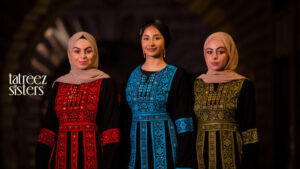The Tatreez Sisters: threading together Palestinian identity

Leanne (left) and Lamar (right) at dressed for the Tatreez Sisters 2023 relaunch
Saoud Khalaf writes in The New Arab:
To commemorate the International Day of Tatreez and Palestinian culture, we met with The Tatreez Sisters, an online platform started by two British-Palestinian women living in the diaspora, that stitch together Palestinian culture and identity.
“Through this Tatreez project, I feel as though I am doing this to serve the Palestinian cause. How do I serve it? By preserving our cultural traditions, because Israel aims to erase Palestine and anything Palestinian from the world.”
As we mark the International Day of Tatreez and Palestinian Culture, the powerful words of Manar, a community organiser in the Shatila Refugee Camp, take us on a journey to understand how the needle became the tool of choice for Palestinian women in the face of colonial efforts to eradicate their existence.
Tatreez is an ancient style of embroidery that has been practised in Palestine for over 3,000 years. It holds great cultural significance for the Palestinians. We should be crystal clear, however, that Tatreez is more than just a fashion trend, and the items adorned with this needlework are much more than just dresses.
My work has allowed me to become acquainted with the Palestinian cause. In May of last year, I went to the Shatila Refugee Camp in Beirut, Lebanon, with a group of friends. While there, I had the opportunity to meet with local community leaders, hear about the issues that the camp’s residents confront, and explore ways to support their activities.
Their primary initiative was to establish a Tatreez centre to help unemployed women in the camp enhance their embroidery abilities while also providing them with a safe and inclusive social atmosphere. We were able to return later that year and construct a sustainable Tatreez centre for these women thanks to a successful fundraising drive.
The importance of Tatreez in Palestinian society has developed through time, with these gowns – locally known as thobes – becoming a symbol of resistance as well as a celebration of the land’s rich history and culture.
